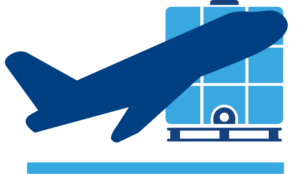Since 2013, Proviron has been active in the Aircraft De-icing Fluids market. All fluids are produced under license from Cryotech De-icing Solutions, who are the market leader in the United States of America with some of the highest quality standard fluids. Proviron’s market share has grown significantly over the past 10 years and Proviron is now a well-recognized supplier in the ADF market. Proviron’s R&D department is constantly searching for the most sustainable products in today’s market. Thanks to this research, Proviron is able to offer ADF made from bio-based MPG. Recycled MPG will become an option in the future.
The aircraft de-icing process is essential for maintaining safety, operational efficiency, regulatory compliance, passenger comfort, protection of aircraft systems and safeguarding an airline’s reputation. All three types of de-icing fluids (Type I, Type II and Type IV) produced by Proviron comply with the standards of aviation authorities such as the Federal Aviation Administration (FAA) in the United States or the European Union Aviation Safety Agency (EASA). All fluids are certified by SMI.
Aircraft de-icing fluids are classified into different types based on their composition, viscosity, and application methods. The most common types of de-icing fluids are Type I, Type II, and Type IV. Each type is designed for specific ice and snow conditions and is applied at different stages of the de-icing process. Here’s an overview of each type:
Type I de-icing fluid is a viscous, heated fluid primarily used for removing thin layers of frost, snow, and ice from aircraft surfaces.
It typically consists of a mixture of propylene glycol and water, along with corrosion inhibitors and surfactants to enhance its effectiveness.
Type I fluid is applied hot, either through spraying or brushing, onto the aircraft’s surfaces before departure to prevent ice accretion during flight.
It is effective in temperatures ranging from about -5°C to -25°C.
Depending on the holdover time, reapplication is required if the aircraft does not depart within a certain timeframe after application.
Type II de-icing fluid is a thicker, more viscous fluid designed for removing moderate to heavy ice and snow accumulations from aircraft surfaces.
It contains a high concentration of thickening agents, such as long-chain polymers, which create a gel-like coating on the aircraft’s surfaces to prevent ice accretion.
Type II fluid is typically applied hot and under pressure, using specialized de-icing trucks equipped with heated spray nozzles.
It is effective in temperatures ranging from about -10°C to -33°C.
Type II fluid has a longer holdover time compared to Type I, allowing for extended protection against ice buildup before departure.
Type IV anti-icing fluid is a viscous, non-Newtonian fluid designed for preventing ice formation on aircraft surfaces during flight.
It contains a high concentration of thickening agents, such as long-chain polymers, which create a gel-like coating on the aircraft’s surfaces to prevent ice accretion.
Type IV fluid is typically applied hot, either before departure as an anti-icing treatment or during flight through onboard anti-icing systems.
It is effective in temperatures ranging from about -10°C to -33°C.
Type IV fluid has a longer holdover time compared to Type I fluids, providing extended protection against ice buildup during flight.
Overall, Type I, Type II, and Type IV de-icing fluids play crucial roles in ensuring the safety and performance of aircraft during adverse weather conditions. By effectively removing ice and snow accumulations or preventing their formation, these fluids help maintain aerodynamic integrity and prevent flight disruptions due to icing-related issues.
Proviron is using Biobased mono-propylene glycol (MPG) as a key ingredient in the production of aircraft de-icing fluids, offering several advantages over traditional petroleum-based formulations. Here’s an overview of aircraft de-icing fluids produced using biobased MPG:
Overall, aircraft de-icing fluids produced using biobased MPG offer a sustainable and environmentally friendly alternative to traditional petroleum-based formulations. By leveraging renewable biomass sources, these fluids contribute to reducing carbon emissions, minimizing environmental impact, and ensuring compliance with regulatory standards while maintaining high performance and safety standards in aviation operations.
As the winter approaches,
de-icing of aircraft is crucial to keep an airport open. Proviron has a lot of
experience in supplying these crucial products on time. With more than 10 years
of experience, our company has never failed in supplying an airport during the
winter period. Please contact our sales specialist via provifrost@proviron.com, to discuss
your requirements. Proviron will be happy to assist in setting up logistics to satisfy
your requirements for security of supply.
Proviron has 2 commercial contacts for its
de-icing business: David Carbonez & Louis Pype. By having its own in-house commercial
service, Proviron can ensure a fast response and high level of customer service.
Proviron is a family-owned company that differentiates itself from the
competition by giving every customer the VIP treatment and by guaranteeing
extreme flexibility. During each winter season, Proviron offers a single point-of-contact
(SPOC) for every customer. This SPOC is reachable 24/7 and handles all aspects
of the business (commercial, technical, operational, environmental, etc.).
Proviron has its own de-icing R&D team and works closely with the Cryotech R&D team from the USA, ensuring it is a world leader in de-icing product innovation. Aircraft Fluid samples can be analyzed by the Proviron lab, to examine properties such as refractive index, viscosity, appearance and pH. Proviron also has a team of full-time QSE experts tasked with providing a quality management system that guarantees a controlled, high-quality manufacturing, testing, inspection and delivery process.



Our website makes use of cookies and similar techniques to ensure you get the best experience.
Via our cookie policy we like to inform you. Please click OK to continue.